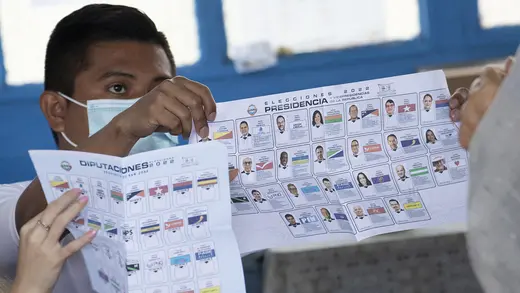Costa Rica’s Presidential Election: What to Know
The two leading candidates to emerge from a large field reflect voters’ concerns about economic malaise and corruption, but there’s little sign of the upheaval seen in other regional elections.
By experts and staff
- Updated
By
- Paul J. AngeloFellow for Latin America Studies
- Andres Villar
Costa Rica’s president will be decided in a runoff after none of the record twenty-five candidates managed to secure enough votes to win during the February 6 election. On April 3, former President Jose Maria Figueres of the center-left National Liberation Party (PLN) will face former Finance Minister Rodrigo Chaves of the Social Democratic Progress Party (PPSD). Both candidates have promised to tackle mounting economic concerns and, despite voter dissatisfaction with the incumbent party (reflected in its crushing defeat in the first round), Costa Rica’s institutions and consensus-oriented policies are likely to withstand either candidate’s victory.
Who is Jose Maria Figueres?
Figueres is an industrial engineer, businessman, and politician who is the son of one of Costa Rica’s most revered political figures. Figueres served as president from 1994 to 1998, as well as foreign trade minister, agriculture minister, and CEO of the World Economic Forum. If elected, he has vowed to address Costa Ricans’ most pressing issues: a roughly 14 percent unemployment rate, rising inflation, and massive debt. He has also promised to promote social inclusion of women and racial and ethnic minorities, reduce extreme poverty through conditional cash transfers, and invest in sustainable development.
Tackling public corruption is also a top priority for voters, and Figueres has been linked to past scandals, including allegations that he received $900,000 in exchange for influencing state contracts with a leading telecommunications company. (He has never been charged.)
Furthermore, massive dissatisfaction with center-left President Carlos Alvarado could hamper Figueres’s chances of victory. During the COVID-19 pandemic, anti-incumbent sentiment has led to punishing electoral results for ruling parties and their affiliates elsewhere in Latin America, the region of the world with the highest reported COVID-19 deaths and the most severe economic contraction.

Who is Rodrigo Chaves?
Chaves is a technocrat who worked at the World Bank for nearly three decades and briefly served as finance minister under Alvarado before departing over disagreements with the president on tax policy. Chaves’s economic experience makes him an attractive candidate to Costa Ricans who have suffered the worst effects of economic mismanagement and a pandemic-induced recession [PDF].
However, Chaves faced accusations of sexual harassment during his time at the World Bank, resulting in his demotion. After his resignation, the institution barred him from future employment and restricted his access to its headquarters.
Chaves’s ideological bent is not readily evident in his rhetoric, which has largely focused on criticisms of the venality and mismanagement of the traditional ruling parties. Despite his affiliation with the outgoing administration, he plays up his humble origins and his party’s lack of misconduct—due to its relatively short time in politics—to present himself as an antiestablishment, anticorruption crusader. Chaves promises to uphold law and order against the country’s traditional political class, even going as far as suggesting the death penalty for acts of public corruption. In addition, he has advocated for pension standardization, fiscal reform, and green energy investments. But the past sexual harassment accusations against him have invited major backlash, in particular from women.
Does this election reflect the populist trend emerging across Latin America?
The candidate for the incumbent Citizens’ Action Party (PAC) attracted less than 1 percent of votes in the February election, and the party lost all its seats in the legislature, signaling a rejection of the last eight years of corruption scandals and weak economic performance. However, the anti-incumbent sentiment that has taken hold in much of Latin America will not necessarily translate into anti-establishment outcomes in Costa Rica.
Many Costa Ricans worry that Chaves’s lack of political experience and his populist discourse could upend Costa Rica’s history of following a moderate political path. Indeed, populist leaders have taken the reins in much of Latin America in recent years, often dismantling checks and balances on their authority.
But unlike recent elections in Peru and Chile, Costa Rica’s is hardly a contest of ideological extremes. The left-right divide on social issues such as women’s reproductive rights and marriage equality, which weighed heavily in Costa Rica’s 2018 election, is notably absent from this electoral cycle. Both candidates have celebrated the country’s reputation as Latin America’s most stable democracy, and the partisan diversity of the incoming legislature—and the fact that neither candidate’s bloc holds a congressional majority—means the next president will need to reach across the aisle to build consensus.
How has Costa Rica achieved such political stability?
Costa Rica’s unique history of postcolonial development, including its early abolition of the military, helped to consolidate its democratic tradition by the mid-twentieth century. Robust civic education, universal health care, and a safe market for foreign investment have also underpinned the country’s stability.
Unlike Costa Rica, much of the rest of Central America faces endemic instability. In El Salvador and Nicaragua, recent years have also seen the consolidation of authoritarian governments. These features have contributed to the region’s worst-ever migration crisis: nearly half of the 1.6 million migrants encountered at the southern U.S. border in fiscal year 2021 were from El Salvador, Guatemala, and Honduras.
Costa Rica is poised to continue leading on migrant and refugee accommodation, environmental protection, and human rights—all issues that will put the incoming government on the right side of U.S. President Joe Biden’s administration as it seeks to address the root causes of migration in Central America and reinvigorate democratic consensus in the Western Hemisphere.